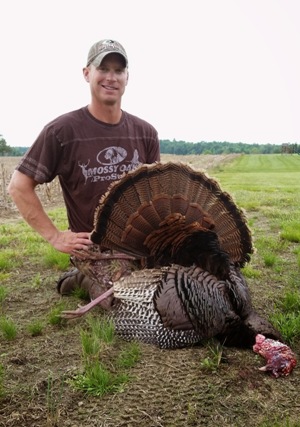 As I’ve mentioned, toward the end of the Kentucky’s turkey season, the gobblers will expand their ranges. Often we’ll get new gobblers coming onto our property that we don’t have any pictures of, and some of our gobblers will be in locations where we've never seen them previously. The good news is that those gobblers still will be vocal, and we can locate them. Toward the end of the season, our gobblers usually will start gobbling at daylight and gobble all the way through the middle of the day. When we find a turkey that’s gobbling later in the morning and until the middle of the day, I know I’ll have a pretty good chance of bagging that tom.
As I’ve mentioned, toward the end of the Kentucky’s turkey season, the gobblers will expand their ranges. Often we’ll get new gobblers coming onto our property that we don’t have any pictures of, and some of our gobblers will be in locations where we've never seen them previously. The good news is that those gobblers still will be vocal, and we can locate them. Toward the end of the season, our gobblers usually will start gobbling at daylight and gobble all the way through the middle of the day. When we find a turkey that’s gobbling later in the morning and until the middle of the day, I know I’ll have a pretty good chance of bagging that tom.
The late season is always my favorite time to hunt turkeys. The main reason is by the end of the season most turkey hunters either have limited-out on gobblers or given up hunting them. So, the turkeys have much less hunter pressure than they’ve had at the first or the middle of the season. Generally most turkey hunters only will allow 1-2 weeks or weekends to hunt turkeys. For that reason, when you're hunting at the end of the season, most of the time when the turkey gobbles, you can get in close enough to that turkey to call him to you, without having to compete for that gobbler with other hunters. I don’t think all the turkeys gobble a lot at the end of the season, but I do know that certain turkeys will gobble from the time they're on the limb until noon or a little after noon. When a turkey is gobbling like that, I know he doesn’t have any hens with him, and he's usually much more willing to come to calls than he is at any other time of the season. If that turkey has experienced a lot of hunting pressure, you really have to do less aggressive calling and use soft calling and infrequent calling. If I'm calling to a turkey, and he's cutting me off by gobbling when I'm calling, I’ll quit calling and wait to see if he'll gobble again. If he doesn’t gobble, he's either coming to me, or he's standing in place waiting to hear me call to him again. I’ll wait maybe 10 minutes. Then I’ll try another call.
The two techniques that work when that turkey doesn’t call back is to circle the bird and call him from a different direction; or try to move closer to the gobbler without him being able to see you move. Many times in the late season here in Kentucky, the turkey may gobble again, but he'll stay in the one spot where he knows a hen should come to him. When a turkey quits gobbling, most people think that bird has gotten with a hen, and they’ll give up on him. However, I've learned that most of the time, the turkey hasn’t moved. He's just remaining on that one spot, waiting on the hen to come to him, or he's coming to me silent.
Another thing to watch out for is if you call to a turkey, and he gobbles to you every time you call, but he's not moving. If I can determine that the gobbler is walking away from me gobbling, I’ll try to circle and get in front of him, and I do some extremely quiet calling. Once I think I'm in front of the gobbler, if he's not moving, I’ll back up away from the gobbler to make him think I'm walking off. Then I make a few light calls and back up a little bit farther. More than likely, he'll come take a look to try to see where that hen is going. This tactic works really well when two people are trying to shoot one turkey. The hunter can stay at the spot where he’s set-up, and the caller can back away, doing the calling. Then the gobbler may come in silent, and the shooter will have a chance to take him.
If the turkey is gobbling and won’t come to you, and the terrain and the foliage will let you get within 50 or 60 yards of that gobbler, so you can see him, then that’s where the “Scoot and Shoot” tactic can be deadly effective. However, make sure no other turkey hunters are in the same woods that you're hunting. I never ever use the “Scoot and Shoot” method when hunting on public lands or on a hunting club with other turkey hunters.
The “Scoot and Shoot” strategy can be extremely effective when you have a turkeys hung-up that won’t move until he sees a hen or what he believes to be another gobbler coming into his territory. The best suggestion I can tell late-season turkey hunters is don’t over-call to a gobbler and don’t call loudly to a tough tom.



























